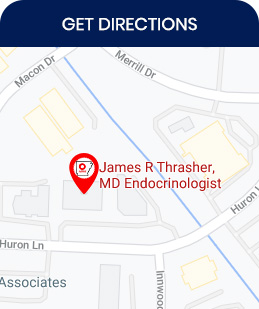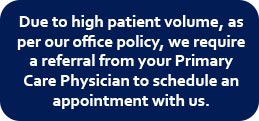Top Reasons To See an Endocrinologist
An endocrinologist is a medical professional who specializes in the endocrine system, which contains glands that produce hormones. If you have diabetes, you should consult an endocrinologist, as they are experts at controlling blood sugar levels and can help you create a treatment plan to manage your diabetes. Another reason is if you suffer from thyroid conditions like hyperthyroidism. Infertility, menopause, and low testosterone levels are among the hormone-related problems that an endocrinologist can assist with. Visit us at the Arkansas Diabetes and Endocrinology Center if you have visited your primary care physician and they have suggested a specialist. For more information, contact our office to schedule an appointment. We serve patients from Little Rock, AR and surrounding areas.


Table of Contents:
What symptoms would you see an endocrinologist for?
What is the most common disease treated by an endocrinologist?
When should a girl see an endocrinologist?
It’s worth visiting an endocrinologist as they are knowledgeable medical specialists who focus on diagnosing and treating hormone-related conditions. Some symptoms that indicate a need to visit an endocrinologist include:
– Chronic fatigue – Persistent fatigue despite adequate rest and sleep can be a symptom of hormonal imbalances, such as thyroid disorders, adrenal insufficiency, or diabetes.
– Fluctuations in weight – Significant weight loss or gain, particularly if unexplained or difficult to control, often indicates a hormonal disorder, such as thyroid or adrenal dysfunction.
– Mood changes – Hormonal imbalances can affect mood, leading to frustrating symptoms such as irritability, anxiety, or depression.
– Menstrual irregularities – Irregular periods, heavy bleeding, or missed periods are often a sign of hormonal imbalance, such as polycystic ovary syndrome (PCOS).
– Infertility – Having difficulty conceiving can be related to hormonal imbalances affecting ovulation or sperm production.
– Symptoms of diabetes – Diabetes is a condition in which the body does not produce enough insulin or is unable to use it effectively. Diabetes can lead to a range of symptoms, including frequent urination, excessive thirst, and fatigue.
– Changes in libido – In some cases, a decrease in sex drive or other sexual dysfunction can be tied to hormonal imbalances.
– Growth abnormalities – Children or adolescents with abnormal growth patterns, such as delayed or early puberty or unusually tall or short stature, often require evaluation by an endocrinologist.
Endocrinologists are experts in the diagnosis and management of hormonal disorders, and they treat a variety of conditions. However, some of the most common diseases seen by endocrinologists include:
– Diabetes – This condition limits the body’s ability to regulate blood sugar levels properly. Endocrinologists are often involved in diabetes diagnosis, management, and treatment.
– Thyroid disorders – Endocrinologists treat all disorders of the thyroid, such as hypothyroidism (an underactive thyroid) and hyperthyroidism (an overactive thyroid).
– Polycystic ovary syndrome (PCOS) – This is a hormonal disorder that affects women of reproductive age. This condition causes symptoms such as menstrual irregularities and infertility.
– Osteoporosis – Endocrinologists often treat individuals with osteoporosis. This condition causes the bones to become weak and brittle and increases the risk of fractures.
– Pituitary disorders – The pituitary gland produces hormones that regulate various bodily functions. Endocrinologists treat disorders that affect the pituitary gland, such as pituitary tumors.
Overall, endocrinologists are trained to diagnose and manage a wide range of hormonal disorders and related medical conditions. Our team works closely with patients to develop tailored treatment plans to suit each individual’s unique needs.
Young women should see an endocrinologist if they experience any symptoms that could point to hormonal imbalances or disorders. Some common scenarios that indicate it’s a good time to consult an endocrinologist include:
– Puberty – If a girl is experiencing early or delayed puberty, an endocrinologist can evaluate her hormone levels and provide treatment.
– Irregular menstrual cycle – When a woman has irregular or absent periods, it’s recommended to visit an endocrinologist to be assessed for hormonal imbalances or disorders, such as polycystic ovary syndrome (PCOS) or thyroid dysfunction.
– Growth concerns – If a girl is not growing or developing at a normal rate, visiting an endocrinologist is advised. The medical professional can evaluate growth hormone levels and provide suitable treatment.
– Thyroid disorders – Symptoms of thyroid dysfunction include weight changes, fatigue, and hair loss. Endocrinologists can evaluate thyroid hormone levels and recommend the most effective course of treatment.
– Adrenal disorders – The most common symptoms of adrenal dysfunction in women include fatigue, weight changes, and irregular periods.
– Diabetes – Symptoms of diabetes include frequent urination, excessive thirst, and fatigue. If a girl exhibits such symptoms, it’s important to visit an endocrinologist to monitor her blood sugar levels.
– Reproductive disorders – Endocrinologists can provide effective treatment for reproductive disorders, such as endometriosis, ovarian cysts, and uterine fibroids.
– Poor bone health – Endocrinologists can evaluate the cause of weak or brittle bones and provide treatment for conditions such as osteoporosis.
– Genetic disorders – Some genetic disorders affect hormone production or function, such as Turner syndrome or congenital adrenal hyperplasia. It’s important to work with an endocrinologist to effectively manage the symptoms of these disorders.
If you are looking to see an endocrinologist, come and meet Dr. James Thrasher at the Arkansas Diabetes and Endocrinology Center. For more information, contact our office to schedule an appointment. We serve patients from Little Rock, AR and surrounding areas. We serve patients from Little Rock AR, Conway AR, North Little Rock AR, Pine Bluff AR, Hot Springs AR, Benton AR, Sherwood AR, Russellville AR, Jacksonville AR, Cabot AR, Searcy AR, Bryant AR, Jonesboro AR, Forrest City AR, Magnolia AR, Camden AR, Malvern AR, Batesville AR, Arkadelphia AR, Clarksville AR, Monticello AR, Heber Springs AR, Morrilton AR, Stuttgart AR, Greenbrier AR, Sheridan AR, and Vilonia AR.







